- Home
- A. S. Byatt
Babel Tower Page 47
Babel Tower Read online
Page 47
“A tender love of spit and spot
And mopping up of shit and snot
Is what most teachers have not got.”
“True enough, as far as it goes,” says Bill.
“But not verse to be prima donnaish about,” says Agatha Mond.
“He is threatening to lampoon us in the Sunday papers and on the television if we don’t print his contribution. He could, too. He could make us look ridiculous in exactly the places we can’t afford to look ridiculous in.”
It is all very civilised. Daniel notices that Agatha does not address any remarks particularly to himself until Frederica goes away into the kitchen with Jacqueline. She does then turn to him, her face shadowed under her hat, against the red and white stripes of her deckchair.
“I am glad …,” she says. “I wanted … I was looking forward to seeing you.”
“So was I,” says Daniel. The two little girls are doing something together at the edge of the garden: Mary, four years older, is showing Saskia something growing, or nesting, between the stones. “They get on,” he says, thinking immediately that this remark is fatuous, since there is no real evidence either way. They are not apparently fighting.
“That’s good,” says Agatha. “I’d like it if …”
Frederica returns. Daniel sees her against the sky, so that her hair is brighter and lighter in the sunlight. She looks across at the two little girls, and says to Agatha, “Mary is quite incredibly like her mother.”
“Like her father, too,” says Agatha. “I think.”
“Oh, do you?” says Frederica. “I’ve never seen that.”
“The set of the mouth,” says Agatha. “A determined chin. Can a chin be determined? The way it is held, anyway.”
“Stephanie’s mouth was like that. Mary’s mouth is exactly like Stephanie’s mouth.”
“Married couples resemble each other,” says Jacqueline. “Statistically, genetically.”
Daniel is deeply annoyed to find that Frederica’s voice has come to resemble her sister’s. Featureless against the sun, she too is a walking memento mori, at least from certain angles; blurred in the light, her edges softened.
“Excuse me,” he says, and rises, and walks away into the house.
Frederica and John say good-bye to everyone and drive off. No explanation of John has been offered or asked for. Bill says to his daughter, vaguely, “Be careful,” and neither Bill nor Winifred suggests that John Ottokar might come again. They are pessimistic, Daniel thinks, about Frederica’s chances of conducting herself sensibly. With reason, he thinks, cross with Frederica almost in the old way. Agatha Mond and Saskia too depart, returning to the Vice-Chancellor’s lodgings in Long Royston. Agatha puts out her hand to Daniel: he takes it: there is no frisson. Something has not happened. It might not have happened even without Frederica. But Daniel is irritated and feels low.
He is approached by Jacqueline, who asks about his work, and tells him about Ruth, who is becoming more and more involved in Gideon Farrar’s Children of Joy. The Children of Joy are a rapidly growing movement in the Church of England. Gideon conducts weekend retreats in seaside barns and country houses, where the Children dance, sing, shout and encounter each other’s bodies in loving exploration, acting out infant joys and terrors, anger and tenderness, birth and death. They eat paschal meals, feeding each other around a communal altar table with home-baked breads and home-brewed wines. There are posters of Gideon’s benign gold-bearded face above a drawing of robed arms enfolding a flock of naked and aspirant adolescent bodies, a pastoral couvade. Daniel does not like either Gideon or the Children of Joy, but is suspicious of his own reasons for this dislike: his is far too inhibited a being, he recognises, ever to be able to sing and shout in communal joy. He asks Jacqueline if Ruth is happy.
“Ecstatically,” says Jacqueline.
“I used to think Marcus was in love with her.”
“He was. Is, perhaps. I don’t understand it. There was a time when they used to make love. Marcus never told me that: she did. She felt she ought to, because he wanted it so much. She said. Then she felt she ought not to, because it was giving off bad messages in the meetings of the Children. They believe they mustn’t hide anything. They had a kind of what I call ‘emotional stripping session’ and someone claimed they could smell bad odours on her body or in her breath or something—I know the phrase ‘bad odours’ was used. So she gave it up. She thinks she ought to be able to make him go to the Children and she feels she’s failed because he doesn’t. They still see each other.”
Daniel stares over the wall of the garden at the wild land. Jacqueline says, “I know you don’t like Marcus.”
“That isn’t true. I think that isn’t true. We’ve known bad things together and no good ones.” He considers Jacqueline. “You like him. That’s good.”
Jacqueline stands a little more upright.
“I love him. I don’t know why. I just one day noticed that I did, that he was it, the one, I was even almost annoyed, because you can’t say he’s a sensible sort of person to fall in love with. Now, Luk Lysgaard-Peacock—he wants to marry me, I think, and he knows what he wants in life—he’s ambitious—and kind, and has a first-rate mind, and respects mine. And Marcus is vague and not-quite-there a lot of the time, and doesn’t know what he wants, except he wants Ruth, in a funny way, but I think that’s because she doesn’t talk, she’s a kind of non-person. I’ve always just supposed if I waited, he would see I was there, one of these days, and change. You know? In a flash of light, see me?”
“It does happen.”
“And we were only kids, and he was much more of a kid than I was, and—and I see that I am ambitious, too, and I quite like waiting and waiting to be seen, because I can get on with my work while I’m waiting—I’ve had an idea about neurons and memory—about the nature of learning—a real idea—I always talk too much to you, don’t I?”
“It’s my job.”
“I hope not only that. But it does mean I go on at you as I would at no one else—I’ve never talked to anyone about Marcus, I just had it all fitted out in my mind—”
“If I say what I think, you’ll be annoyed.”
“Say it, all the same.”
“I think you should look at Luk Lysgaard-Peacock. In a different way.”
“You don’t really think that. You know better.”
“I have to go on believing in sense, in the possibility of good sense prevailing.”
“Not much evidence of that, in the world we live in.”
“Not much evidence. I agree.”
“Whereas love is all over.”
Daniel laughs. “All over.” He says, “If you are going to work on learning—”
“It’s all biochemistry. Love, learning, the lot. Whatever else it is. And don’t say knowing that—seeing it that way—doesn’t change anything—because actually, it does. It does.”
Frederica goes to Paddington. She stands under the Departures and Arrivals. Her mouth is dry, her heart bangs audibly, her blood fizzes. She is alone. Her brown shoulder-bag hangs below the hem of her bright green cotton shift, which hugs her buttocks. Her long, thin legs tremble visibly. Her eyes are made up like does’ eyes. She has had her hair cut, finally: it is a shining bronze cap, or helmet, with pointed tongues licking her cheekbones. At night, in the basement flat, waiting for John Ottokar, she is alive with apprehension, but not like this. This is so extreme, it is abject.
The train comes in. She makes her legs move towards the barrier. It is a very long train, and has come a long way. She jostles for position, she stares. The crowd hurries from the train. From far back she sees the red head bobbing and darting; she hears the running feet scurry and thud; she sees the stout figure weaving its slower way after him. He is wearing a new jacket she does not know, and new, polished shoes. He reaches her; his head butts her crotch; his grasping hands go out and clutch her backside; she bends down; they clutch, they cling, they grip, the small body tries to batter its way
back into the thin one it came from. He kicks her legs, he pulls at her neckline, he dislodges her handbag. She kneels on the dirty concrete to contain and support him. He is crying out: she understands the words.
“I hate it. You’ve cut your hair, I hate it. You didn’t tell me, I hate you. It’s horrible, I think it’s horrible, I hate it.”
The two small hands scrabble in the smooth cap, dishevelling it, bushing it, tugging, twisting. It is so well cut it falls, raggedly, more or less back into place.
Pippy Mammott arrives, out of breath, with Leo’s satchel and suitcase, which she dumps in front of Frederica. She stands and puffs, solid in a red-white-and-blue-checked shirtwaist dress and Clark’s sandals. She doesn’t speak to Frederica. She says, “Well, good-bye, Leo. Come back soon. We’ll miss you.”
Leo turns round, still clenching a handful of Frederica’s hair, and holds up his face to be kissed. Pippy Mammott bends to kiss him. Her face is very close to Frederica’s. She purses her mouth, and Frederica thinks for one dreadful moment that she is going to spit on her. Pippy Mammott’s eyes are full of tears. As she kisses Leo, these begin to run out violently, and splash on his small, freckled cheeks.
“We had a good time,” says Pippy Mammott to Leo Reiver.
“A very good time,” says Leo. “Tell Sooty I’m coming back.”
He twists his hand, still full of Frederica’s hair, to wipe his cheek. He hurts her.
“Thank you,” says Frederica to Pippy.
“Don’t. Don’t thank me,” says Pippy. “If I had my way.” She does not finish this sentence.
“Come on, Leo,” says Frederica. “Let’s go home.”
Her own tears have come from nowhere and are now falling heavily, dripping from her chin on to Leo’s shoulder. She could not find a word for why she is weeping. She cannot control it. Her hands remember Leo’s chest, his waist, his weight.
The two women weep, angrily and helplessly. The little boy looks from one to the other, and transfers his attention to a pigeon, swooping in the station canopy, with the light on its wings.
XIV
In September, Leo and Saskia go to school. Both Agatha and Frederica accompany the two, who walk stolidly, hand in hand, through the grey, dusty Kennington streets. The William Blake School has been chosen by Agatha after careful consultation with the school inspectors with whom she works. Lebanon Grove is a treeless crescent of little shops, in the centre of which is the school, a high, gloomy red-brick cube with dusty, barred windows, inside which can vaguely be seen dangling paper parrots and chickens, poppies and clouds. There is a large asphalt playground behind a high, spiked, barred railing, and three entrances—churchy openings with Gothic stone arches and heavy-hasped doors, over which, carved in the stone, are the legends BOYS, GIRLS and MIXED INFANTS. Despite its grim Victorian look, the school has a reputation, Agatha assures Frederica, for progressiveness and innovation. The two women are seized with terror. The two children clasp each other: yesterday Leo said, “The good thing about Hansel and Gretel was that there were two of them, I think. They were all right because they were two.” Larger children rush in past the smaller ones; pushing, shoving, calling. The children are mixed: black, brown, white, and mixtures of these. The Reception teacher meets the two on the doorstep of MIXED INFANTS and takes their hands. She is a slip of a girl in a strawberry-coloured mini-skirt and high black patent boots. Her hair is dandelion-coloured, her lips painted a ghostly pale cream, her eyes black-rimmed, with false lashes. She resembles a large doll. Frederica had expected a motherly body and sees a child amongst children. Miss Nightingale’s voice is kind and sensible. She leads them into the cloakroom, where each child has a hook with an animal and his or her name. Leo’s hook has a lion, and the legend: Leo. Lion. Miss Nightingale tells him his name means lion, and he says, “I know,” and Miss Nightingale says she is pleased. Saskia’s hook has a fluffy kitten and says: Saskia. Cat. Saskia says she does not want a cat, she does not like cats. Miss Nightingale looks around and offers her a camel or a sheep. Saskia chooses the camel. “They spit,” Saskia tells Miss Nightingale, who says, “I know. I’ve seen them. They are very contrary.”
Agatha and Frederica say good-bye. They walk out into the street, bumping against hurtling children. Agatha says it is a good school: the buildings may be grotty, but the children’s work is displayed along every corridor; there is a frieze of The Hobbit, made by a whole class, with the travelling dwarves with their coloured hoods, Bilbo the Hobbit with his pipe and his furry feet, Gandalf the wizard with his flowing white beard and flaming staff, a mountainous background with peering orcs in cave-mouths and wolves on the skyline, a wood full of fat black spiders and carefully constructed webs, and at the very end, Smaug the dragon in his cave, made out of shining milk-bottle tops for scales, and lying on a treasure made of coloured sweet wrappings and tiny plastic beads. The collage is excellent: Agatha tells Frederica to observe that the children have had to consider how trees grow and spider-webs are woven, to think about perspective and be inventive with materials. On the corridor above this, illustrations to William Blake’s poems “The Lamb,” “The Tiger,” “The Little Boy Lost,” “The Clod and the Pebble” celebrate the school’s name. There was nothing like this in the schools of Frederica’s youth. She finds it exciting and invigorating. But she does not know how Leo will survive group life. In the tiled corridors the shrill voices echo and bay. Frederica was a child pushed aside by, hunted by, other children. A solitary, angry child. Does this hand on? She says to Agatha, “I was no good at group life. I hated school.”
“Me too. It seemed eternal. It dragged so. I say to myself, Where are they now, the ones who were so successful, so popular as children?”
At home Frederica has another long, legal envelope. This contains a letter from Arnold Begbie, and encloses, he says, the Respondent’s Answer to Frederica’s petition. As you will see, says Begbie, the respondent denies all the material facts alleged in our petition. His solicitor has written a letter, of which I enclose a copy, urging you to meet him with a view to reconciliation and restitution of conjugal rights. He also claims custody of your child.
Frederica reads the Answer, on its heavy foolscap paper.
The respondent, Nigel Reiver, by Messrs. Tiger and Pelt, his solicitors, in answer to the petition filed in this suit, says:
(1) That he is not guilty of cruelty as alleged in the said petition.
(2) That he is not guilty of adultery, as alleged in the said petition.
(3) That he claims custody of the child, Leo Alexander, mentioned in the said petition, and proposes the following arrangements for his care and upbringing:—
That he should live with the respondent in the family home, Bran House, Longbarrow, where he will be cared for by the housekeeper, Miss Philippa Mammott, who has cared for him from birth, and by his two aunts, Miss Rosalind and Miss Olive Reiver.
That he should go to Brock’s Preparatory School, for which he is entered, and to which his father went, and subsequently to Swineburn School in Cumberland, for which he is also entered.
That he should visit his mother regularly in the holidays and that she should visit him when she wishes to do so, at the family home, Bran House.
Frederica goes to see her solicitor. She sits in the barred light, and hears her own voice, a pleading voice, a panicky voice.
“He can’t take him, can he?”
“It would be very unusual for the court to award custody of so small a child away from the mother. Very unusual. Very bad luck. We must ensure it doesn’t happen. We must fight. Since your husband clearly intends to fight, we must fight back. I had imagined he might at least have admitted the adultery—if we would drop the cruelty—that would have been civilised, though we would always have to be careful about appearing to collude, or connive at such adultery. For our legal system is oppositional, Mrs. Reiver—the law requires that there be a guilty party and an innocent party, and is hostile to any appearance of agreement to divorce, seeks ze
alously for evidence of manufactured evidence, or lax moral attitudes suddenly conveniently tightened. Not that that appears to be the case here. Your husband is loving and forbearing—”
“Furious and pig-headed.”
“As you please. He will say he is loving and forbearing. He condones desertion. He wants you back. You must prove that he treated you badly enough for divorce to be a reasonable requirement. I shall instruct Griffith Goatley He fights like a bull terrier. We need witnesses to the cruelty, and witnesses to his behaviour when away from you. You would not consider instructing an enquiry agent?”
“No. That’s a horrible idea. And besides, I can’t afford it, I can’t afford anything.”
“I will ask about those clubs. The Honeypot. Tips and Tassels. There may be a doorman. A barman. An ex-doorman, an ex-barman. They are reluctant to be witnesses. It is not good for their employment. They may know a young woman who may be prepared to say something. It is worth a try. We must have a case.”
“He threw an axe at me.”
Begbie looks mournful. “We need to prove it.”
“I have a huge scar. Pink. It throbs in rainy weather.”
“We need to be able to show what caused it.”
“I don’t want Leo in a dormitory in a prep school. It’s horrible, it’s unnatural, I can’t bear to think of it—he’s little—”
“Lots of little boys survive quite adequately.” A pause. “I did.” Another pause. “The judge probably did.”
His face is lugubrious, frowning with what might be anxiety and might be a kind of professional Schadenfreude.
“He’d hate it.”
“We must hope it doesn’t come to that. It shouldn’t. I’ll get Goatley. Meanwhile, think of anyone who can describe your husband’s unreasonable, cruel, or aggressive behaviour. Maids? We must get on to the doctors. Your friends?”

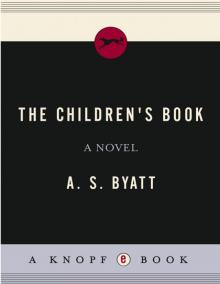 The Children's Book
The Children's Book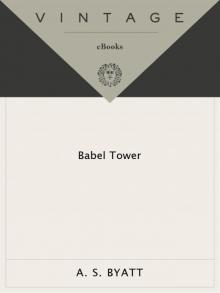 Babel Tower
Babel Tower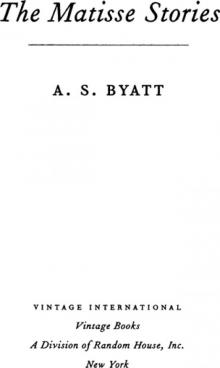 The Matisse Stories
The Matisse Stories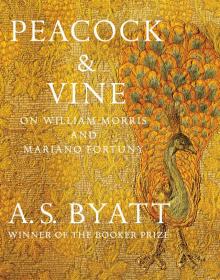 Peacock & Vine: On William Morris and Mariano Fortuny
Peacock & Vine: On William Morris and Mariano Fortuny Elementals: Stories of Fire and Ice
Elementals: Stories of Fire and Ice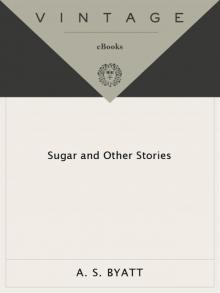 Sugar and Other Stories
Sugar and Other Stories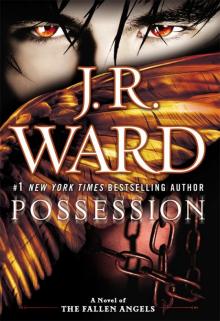 Possession
Possession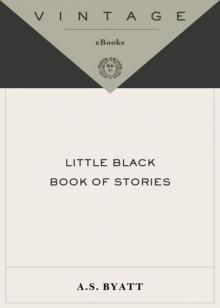 Little Black Book of Stories
Little Black Book of Stories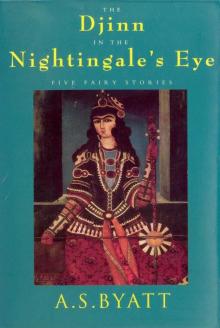 The Djinn in the Nightingale's Eye
The Djinn in the Nightingale's Eye The Virgin in the Garden
The Virgin in the Garden The Game
The Game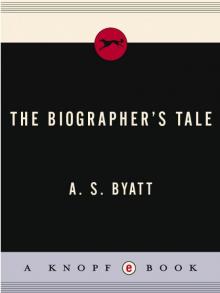 The Biographer's Tale
The Biographer's Tale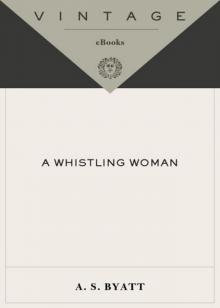 A Whistling Woman
A Whistling Woman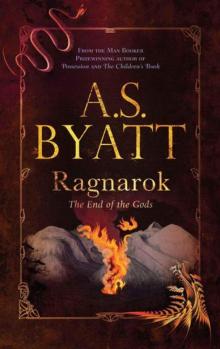 Ragnarok
Ragnarok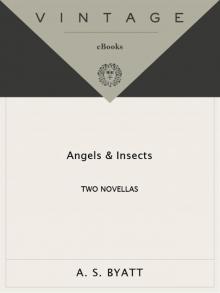 Angels & Insects: Two Novellas
Angels & Insects: Two Novellas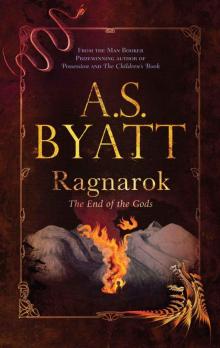 Ragnarok: the End of the Gods (Myths)
Ragnarok: the End of the Gods (Myths)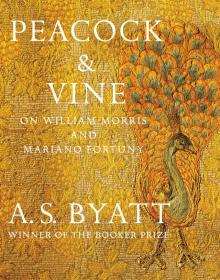 Peacock & Vine
Peacock & Vine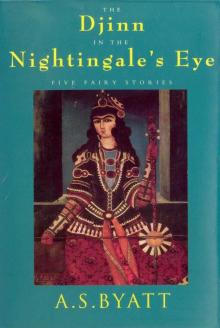 The Djinn in the Nightingale's Eye (Vintage International)
The Djinn in the Nightingale's Eye (Vintage International)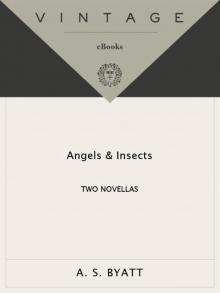 Angels and Insects
Angels and Insects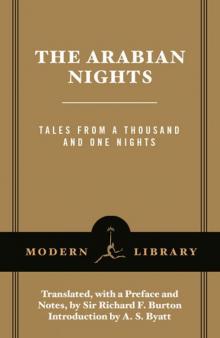 The Arabian Nights: Tales from a Thousand and One Nights (Modern Library Classics)
The Arabian Nights: Tales from a Thousand and One Nights (Modern Library Classics) Elementals
Elementals